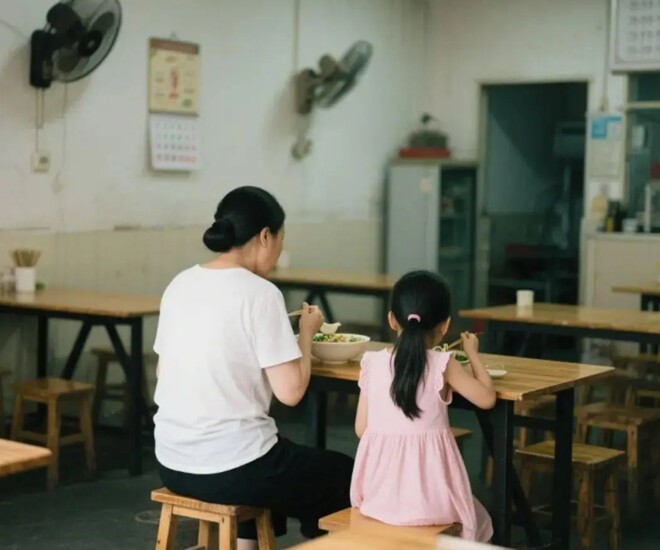One day, a mother and her ten-year-old daughter walked into a small noodle shop located in an alley in Shenzhen. The little girl was dressed in an expensive dress, while the mother wore a faded t-shirt and jeans.
“Mom, order quickly. I want beef noodles with a boiled egg!” the girl urged her mother as they entered.
Immediately, the girl kicked the chair and complained that she was hungry. The mother, with beads of sweat on her forehead, gently soothed her: “You’ll get to eat soon.”
After paying the bill, the mother went to the restroom for a moment.

Illustration photo
When the beef noodles were served, before the mother returned, the girl had finished all the beef, including her mother’s share. When the mother came back and saw the empty bowl, she said nothing.
However, the daughter called the waiter and pretended to be curious: “Why isn’t there any meat in Mom’s bowl? You forgot to put it in!”
As the waiter tried to explain, the noodle shop owner intervened, having witnessed the entire incident. The owner quickly brought out another portion of beef to add to the mother’s bowl.
Surprisingly, the daughter also took this new portion of beef without leaving any for her mother.
After they finished eating, the mother and daughter left the shop. The owner overheard their conversation as they ate, with the mother reminding her daughter of a few things, to which the girl paid no attention, continuously demanding that her mother buy her new shoes.
According to the owner, the mother’s surname was Zhang. Her husband had passed away early, and she had brought her daughter from elsewhere to Shenzhen to make a living. She ran a stall during the day and delivered food in the evening, striving to give her daughter a better life.
However, her indulgence seemed to foster ingratitude rather than gratitude, and it encouraged the daughter’s stubbornness.
Throughout the week, she would set up her stall on the street to sell toys under the scorching sun, while her daughter hid behind the stall, engrossed in her mobile phone.
The previous week, the girl had thrown a tantrum at a shopping mall, even smashing a display cabinet to get her hands on a limited-edition toy. In the end, the mother had to empty her wallet to calm the situation.
Knowing their situation well, the noodle shop owner couldn’t help but feel sad after witnessing the incident that day. He made a “prediction” about the mother’s future: “If she continues to spoil her daughter like this, she’ll end up in a nursing home.”

Illustration photo
Parents Need to Be “Tough”
In life, many parents don’t want their children to endure hardships and try to shield them from all difficulties. However, if they truly love their children, they must let them experience failure.
When parents turn their love into unconditional devotion, their children’s demands become limitless. They won’t be able to stand on their own feet, and they won’t know how to be grateful.
Professor Li Meijin once said:
“You should educate your children from an early age. Otherwise, society will educate them for you in the future.”
When children are young, parents will cover up for their mistakes. But as they grow up, they will have to face the consequences themselves. The indulgence you give your child now will become a “slap in the face” from society later on.
Only by teaching children to take responsibility for themselves can they grow up to be independent, grateful, and promising individuals.
Parents who truly “excel at raising their children” have a certain degree of “toughness.” The tougher the parents, the more outstanding the children.
This “toughness” doesn’t mean being indifferent to your children but rather restraining them and allowing them to develop independence through challenges.
Parents with true foresight understand that only by instilling self-discipline, perseverance, and a sense of responsibility during their children’s formative years can they create a better life with unlimited possibilities in the future.
Strict discipline now is precisely to give children more choices in life later on.
If you’re willing to be a little strict with your child, they will thank you for it for the rest of their lives.
Managing, Teaching, and Punishing
“Loving a child but not teaching them is like giving them poison when they’re hungry; it only causes harm.”
This means that if parents only know how to love their children without teaching them, it’s like giving them poison when they’re hungry. It may seem like love, but it’s actually harmful.
Never choose to neglect your child when they need discipline. Know that the golden period of a child’s development only lasts a few short years. Once you miss it, there’s no going back.
Good education includes management, teaching, and punishment.
Only through this will children be able to walk more steadily on the path to adulthood and become responsible, grateful, and positive individuals.
1. Discipline: Set rules and build awareness of these rules for your children
As the saying goes, there can be no order without rules.
Only by raising children with both love and discipline can we help them establish clear boundaries, learn self-discipline within these boundaries, and ultimately achieve true freedom.
When setting family rules, you can include your children in the process and clearly state what they can and cannot do. When children are involved in decision-making, the rules become less of a constraint and more of a mutual agreement.
When setting rules, the ultimate goal must be clear, and there should be no compromise on matters of principle.
You can patiently explain the meaning of the rules to your children but never allow them to bargain.
The ultimate purpose of rules is not to restrict but to guide. The more specific the parents’ expectations, the clearer the sense of boundaries in the child’s mind.
When children understand and remember these rules, they can freely explore within safe limits and eventually become individuals with both rationality and independent thinking.
2. Teaching: Lead by example instead of just lecturing
Children are a reflection of their parents. Education is not just about “lecturing” but also about “teaching by example.”
If you want your children to spend less time on their phones, put your phone down first and read a book or play sports with them instead.
After your child tells a lie, share your own experience of making a mistake but being honest about it…
Parents are their children’s best teachers. If you want your children to be excellent, you must first set an example for them.
Children won’t listen to what you say, but they will observe what you do. Sitting down and growing with your children is more powerful than standing and lecturing.
3. Punishment: Teach children to take responsibility for their actions
“Don’t walk the path that your children must walk, and don’t make the mistakes that your children must make.”
Making mistakes is an inevitable part of growing up, and all children will go through it. Punishing children doesn’t mean suppressing them with authority but rather guiding them.
Only through reasonable punishment will children understand what they can and cannot do and take responsibility for their actions.
First, punishment must be timely so that children can clearly associate their wrongdoing with the punishment and recognize the issue.
Second, we must get the degree of punishment right. If it’s too light, children will feel that making mistakes isn’t a big deal. If it’s too severe, it may cause excessive harm to the child.
Finally, after punishing, review the situation with the child so they understand their mistake, how to correct it, and how to avoid making similar mistakes in the future.
“4 Magical Phrases to Use When Your Child Argues Back: A Guide for Parents”
“The Power of Effective Communication: Transforming Defiant Children into Obedient Angels.
As parents, we hold the key to unlocking our children’s potential for obedience and respect. Our communication style plays a pivotal role in teaching our defiant little ones to become more compliant and understanding.”





































